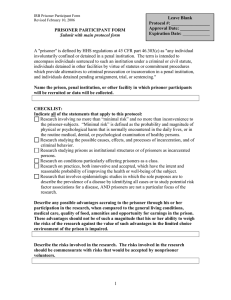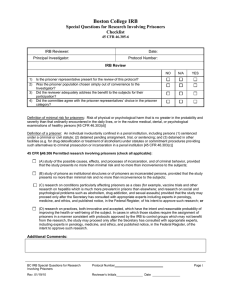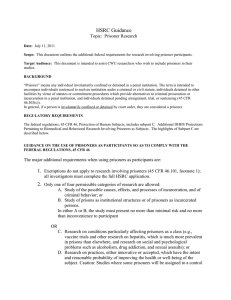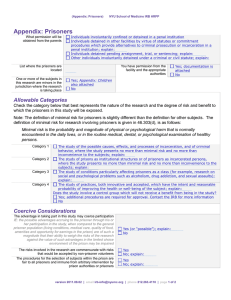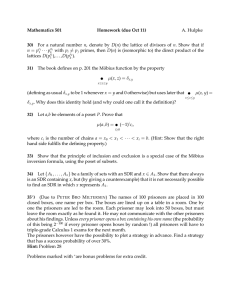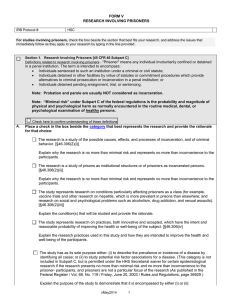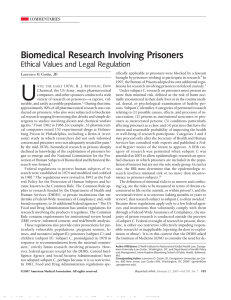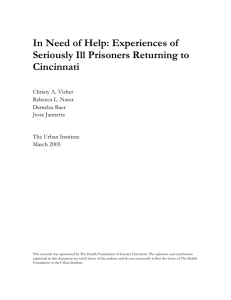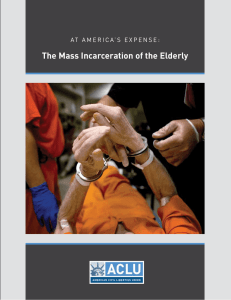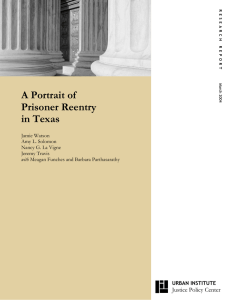Questionnaire C1: S C D
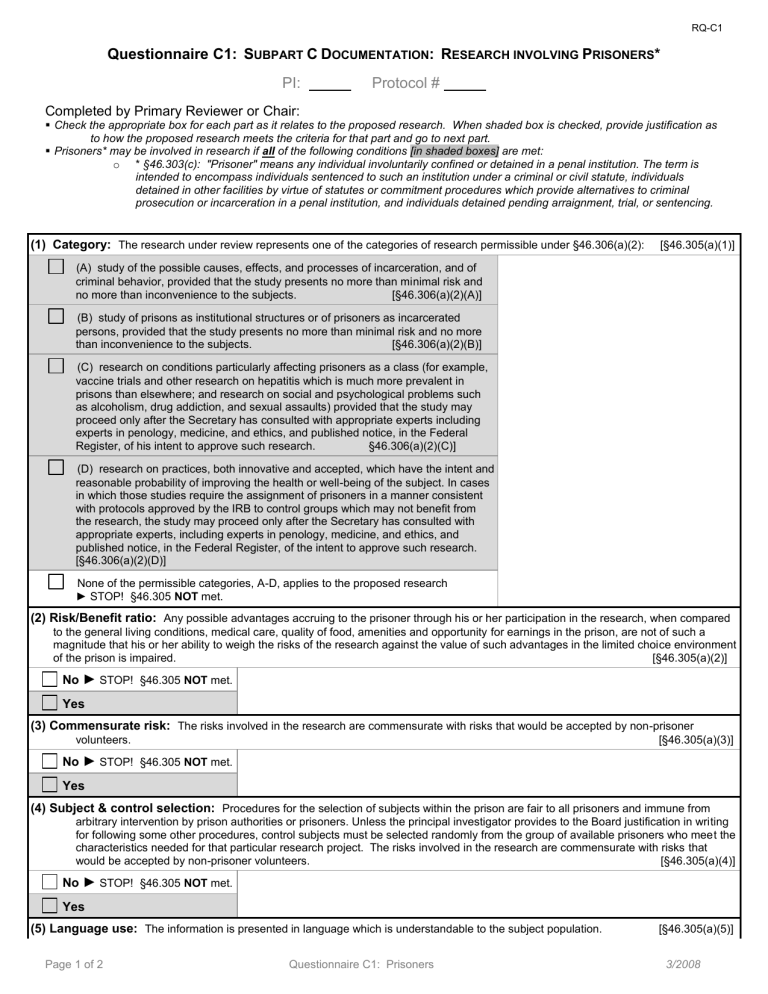
RQ-C1
Questionnaire C1: S
UBPART
C D
OCUMENTATION
: R
ESEARCH INVOLVING
P
RISONERS
*
PI: Protocol #
Completed by Primary Reviewer or Chair:
Check the appropriate box for each part as it relates to the proposed research. When shaded box is checked, provide justification as to how the proposed research meets the criteria for that part and go to next part.
Prisoners* may be involved in research if all of the following conditions [in shaded boxes] are met: o * §46.303(c): "Prisoner" means any individual involuntarily confined or detained in a penal institution. The term is intended to encompass individuals sentenced to such an institution under a criminal or civil statute, individuals detained in other facilities by virtue of statutes or commitment procedures which provide alternatives to criminal prosecution or incarceration in a penal institution, and individuals detained pending arraignment, trial, or sentencing.
(1) Category:
The research under review represents one of the categories of research permissible under §46.306(a)(2): [§46.305(a)(1)]
(A) study of the possible causes, effects, and processes of incarceration, and of criminal behavior, provided that the study presents no more than minimal risk and no more than inconvenience to the subjects.
[§46.306(a)(2)(A)]
(B) study of prisons as institutional structures or of prisoners as incarcerated persons, provided that the study presents no more than minimal risk and no more than inconvenience to the subjects. [§46.306(a)(2)(B)]
(C) research on conditions particularly affecting prisoners as a class (for example, vaccine trials and other research on hepatitis which is much more prevalent in prisons than elsewhere; and research on social and psychological problems such as alcoholism, drug addiction, and sexual assaults) provided that the study may proceed only after the Secretary has consulted with appropriate experts including experts in penology, medicine, and ethics, and published notice, in the Federal
Register, of his intent to approve such research. §46.306(a)(2)(C)]
(D) research on practices, both innovative and accepted, which have the intent and reasonable probability of improving the health or well-being of the subject. In cases in which those studies require the assignment of prisoners in a manner consistent with protocols approved by the IRB to control groups which may not benefit from the research, the study may proceed only after the Secretary has consulted with appropriate experts, including experts in penology, medicine, and ethics, and published notice, in the Federal Register, of the intent to approve such research.
[§46.306(a)(2)(D)]
None of the permissible categories, A-D, applies to the proposed research
► STOP! §46.305
NOT met.
(2) Risk/Benefit ratio:
Any possible advantages accruing to the prisoner through his or her participation in the research, when compared to the general living conditions, medical care, quality of food, amenities and opportunity for earnings in the prison, are not of such a magnitude that his or her ability to weigh the risks of the research against the value of such advantages in the limited choice environment of the prison is impaired.
[§46.305(a)(2)]
No
► STOP! §46.305
NOT met.
Yes
(3) Commensurate risk:
The risks involved in the research are commensurate with risks that would be accepted by non-prisoner volunteers.
[§46.305(a)(3)]
No
► STOP! §46.305
NOT met.
Yes
(4) Subject & control selection:
Procedures for the selection of subjects within the prison are fair to all prisoners and immune from arbitrary intervention by prison authorities or prisoners. Unless the principal investigator provides to the Board justification in writing for following some other procedures, control subjects must be selected randomly from the group of available prisoners who meet the characteristics needed for that particular research project. The risks involved in the research are commensurate with risks that would be accepted by non-prisoner volunteers. [§46.305(a)(4)]
No
► STOP! §46.305 NOT met.
Yes
(5) Language use:
The information is presented in language which is understandable to the subject population. [§46.305(a)(5)]
Page 1 of 2 Questionnaire C1: Prisoners 3/2008
RQ-C1
No
► STOP! §46.305 NOT met.
Yes
(6) Parole status:
Adequate assurance exists that parole boards will not take into account a prisoner's participation in the research in making decisions regarding parole, and each prisoner is clearly informed in advance that participation in the research will have no effect on his or her parole.
[§46.305(a)(6)]
No
► STOP! §46.305
NOT met.
Yes
(7) Follow-up care:
Where the Board finds there may be a need for follow-up examination or care of participants after the end of their participation, adequate provision has been made for such examination or care, taking into account the varying lengths of individual prisoners' sentences, and for informing participants of this fact. [§46.305(a)(7)]
No
► STOP! §46.305 NOT met.
Yes
[i.e. follow-up care needed & adequate provisions have been made]
► Subpart C: §46.305 met.
N/A
[i.e. follow-up care not needed] ► Subpart C:
§46.305 met.
Additional comments:
R
EVIEWED
B
Y
:_______________________________________________D
ATE
:________________
Page 2 of 2 Questionnaire C1: Prisoners 3/2008




